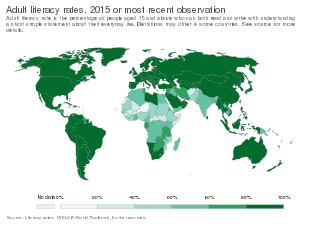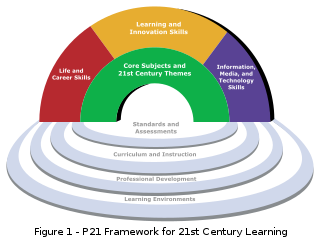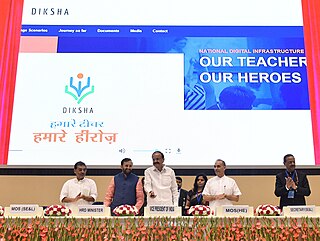Related Research Articles

Literacy in its broadest sense describes "particular ways of thinking about and doing reading and writing" with the purpose of understanding or expressing thoughts or ideas in written form in some specific context of use. In other words, humans in literate societies have sets of practices for producing and consuming writing, and they also have beliefs about these practices. Reading, in this view, is always reading something for some purpose; writing is always writing something for someone for some purpose. Beliefs about reading, writing and their value for society and for the individual always influence the ways literacy is taught, learned, and practiced.

Adult education, distinct from child education, is a practice in which adults engage in systematic and sustained self-educating activities in order to gain new forms of knowledge, skills, attitudes, or values. It can mean any form of learning adults engage in beyond traditional schooling, encompassing basic literacy to personal fulfillment as a lifelong learner, and to ensure the fulfillment of an individual.

Numeracy is the ability to understand, reason with, and to apply simple numerical concepts. The charity National Numeracy states: "Numeracy means understanding how mathematics is used in the real world and being able to apply it to make the best possible decisions...It’s as much about thinking and reasoning as about 'doing sums'". Basic numeracy skills consist of comprehending fundamental arithmetical operations like addition, subtraction, multiplication, and division. For example, if one can understand simple mathematical equations such as 2 + 2 = 4, then one would be considered to possess at least basic numeric knowledge. Substantial aspects of numeracy also include number sense, operation sense, computation, measurement, geometry, probability and statistics. A numerically literate person can manage and respond to the mathematical demands of life.
The Key Skills Qualification is a frequently required component of 14-20 education in England, Northern Ireland and Wales. The aim of Key Skills is to encourage learners to develop and demonstrate their skills as well as learn how to select and apply skills in ways that are appropriate to their particular context.
The history of education in Africa can be roughly divided into pre- and post- colonial periods. Since the introduction of formal education to Africa by European colonists, African education, particularly in West and Central Africa, is characterised by both traditional African teachings and European-style schooling systems. The state of education reflects not only the effects of colonialism, but instability resulting from and exacerbated by armed conflicts in many regions of Africa as well as fallout from humanitarian crises such as famine, lack of drinking water, and outbreaks of diseases such as malaria and Ebola, among others. Although the quality of education and the quantity of well-equipped schools and teachers has steadily increased since the onset of the colonial period, there are still evident numerous inequalities in the existing educational systems based on region, economic status, and gender.
The Welsh Baccalaureate, or Welsh Bacc, is an educational qualification delivered in secondary schools and colleges across Wales. The Welsh Government says that it gives broader experiences than traditional learning programmes, developing transferable skills useful for education and employment. The Welsh Bacc is offered at Advanced, National Foundation and National/Foundation level, and is studied alongside a range of academic and vocational qualifications.
The Western Australian Certificate of Education (WACE) is the credential awarded to students who have completed senior secondary education in the state of Western Australia. It is the Western Australian graduation certificate of the Australian Senior Secondary Certificate of Education. Students are required to meet various breadth and depth requirements, achievement standards and literacy and numeracy standards across their final years of schooling. As of the 2020 WACE, there are 106 courses available for students to study. Many WACE students are awarded an Australian Tertiary Admission Rank (ATAR), summarising their results across all areas of study into one ranking for the purposes of university admission. Students may choose from ATAR courses, which count directly towards their ATAR, Vocational Education and Training courses, which are more practical courses and can lead to further vocational opportunities, and, from 2021, General courses, which provide pathways to university, employment, or further vocational education and training. From 2010, the WACE replaced the Tertiary Entrance Exam (TEE), as the standard academic examination for school leavers in Western Australia.

Education in Guyana is provided largely by the Government of Guyana, through the Ministry of Education and its arms in the ten different regions of the country. Guyana's education system is a legacy from its time as British Guiana, and is similar to that of the other anglophone member states of the Caribbean Community, which are affiliated to the Caribbean Examinations Council (CXC). School curricula, funding, standards and other policies are set by the central government and implemented through the Ministry of Education and related agencies. The Education System is divided into eleven districts, ten of which correspond to the national administrative and geographical regions of the country, while the capital, Georgetown, is treated as a separate education district, district 11. With 8.3% of its GDP spent on education, Guyana sits with Cuba, Iceland, Denmark and Botswana as among the few countries with top spending on education.
The Gershon Efficiency Review was a review of efficiency in the UK public sector conducted in 2003-4 by Sir Peter Gershon.
Skills for Life is a national lifelong learning strategy in England for improving adult skills, designed to help learners develop their reading, writing, maths, technical, and digital skills. It provides universal free education and training; including courses in digital, numeracy and transferable skills; traineeships; apprenticeships; and vocational qualifications for all adults in further education colleges and beyond.

Education in Victoria, Australia is supervised by the Department of Education and Training (DET), which is part of the State Government and whose role is to "provide policy and planning advice for the delivery of education". It acts as advisor to two state ministers, that for Education and for Children and Early Childhood Development.
Education in Tajikistan consists of four years of primary school followed by two stages of secondary school. Attendance at school is mandatory from age seven to seventeen. In accordance with the Law on Higher Education and Professional Postgraduate Education the country provides for the following levels of higher education:

The UK Commission for Employment and Skills was a non-departmental public body that provided advice on skills and employment policy to the UK Government and the Devolved Administrations.

Train to Gain (T2G) was a UK government-funded initiative to deliver vocational training to employed adults. It was discontinued in 2010.

The National Assessment Program – Literacy and Numeracy (NAPLAN) is a series of tests focused on basic skills that are administered to Australian students in year 3, 5, 7 and 9. These standardised tests assess students' reading, writing, language and numeracy and are administered by the Australian Curriculum, Assessment and Reporting Authority (ACARA). The National Assessment Program is overseen by the Education Ministers Meeting.

The Budget of His Majesty's Government is an annual budget set by HM Treasury for the following financial year, with the revenues to be gathered by HM Revenue and Customs and the expenditures of the public sector, in compliance with government policy. The budget statement is one of two statements made by the Chancellor of the Exchequer in the House of Commons, with the Spring Statement being made the following year.
National Numeracy is an independent charity based in Brighton, UK, that promotes the importance of numeracy and "everyday maths".

21st century skills comprise skills, abilities, and learning dispositions that have been identified as being required for success in 21st century society and workplaces by educators, business leaders, academics, and governmental agencies. This is part of a growing international movement focusing on the skills required for students to master in preparation for success in a rapidly changing, digital society. Many of these skills are also associated with deeper learning, which is based on mastering skills such as analytic reasoning, complex problem solving, and teamwork. These skills differ from traditional academic skills in that they are not primarily content knowledge-based.

The National Education Mission is an overarching programme for the school education sector extending from pre-school to class 12, launched in 2018. It was allocated a budget of ₹385.72 billion (US$4.8 billion) in the 2019 Interim Union Budget of India. The stated mission comprises four schemes, namely Saakshar Bharat, Sarva Shiksha Abhiyan, Rashtriya Madhyamik Shiksha Abhiyan and the Centrally Sponsored Scheme on Teacher Education (CSSTE). In 2021, the NIPUN Bharat Mission was launched as part of Samagra Shiksha Abhiyan, teaching literacy and numeracy skills in universities by Grade 3.

Sustainable Development Goal 4 is about quality education and is among the 17 Sustainable Development Goals established by the United Nations in September 2015. The full title of SDG 4 is "Ensure inclusive and equitable quality education and promote lifelong learning opportunities for all".